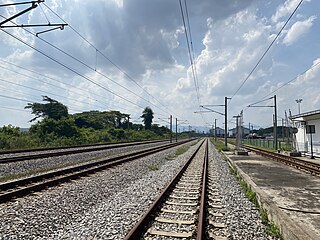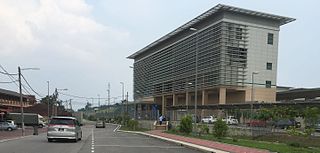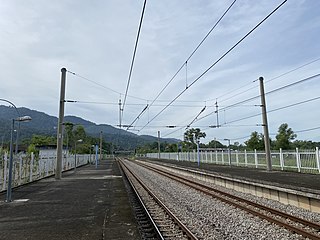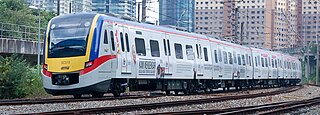Keretapi Tanah Melayu Berhad (KTMB) or Malayan Railway Limited, colloquially referred to simply as KTM, is the main rail operator in Peninsular Malaysia. The railway system dates back to the British colonial era, when it was first built to transport tin. Previously known as the Federated Malay States Railways (FMSR) the Malayan Railway Administration (MRA), and the Malayan Railway, Keretapi Tanah Melayu acquired its current name in 1962. The organisation was corporatised in 1992, but remains wholly owned by the Malaysian government.

KTM Komuter is a commuter rail system in Malaysia operated by Keretapi Tanah Melayu (KTM). It was introduced in 1995 to provide local rail services in Kuala Lumpur and the surrounding Klang Valley suburban areas. Services were later expanded to other parts of Malaysia with the introduction of the Northern and Southern sectors.

Batu is a parliamentary constituency in the northern outskirts of Kuala Lumpur, Malaysia, covering the area between Sentul and Batu Caves.

Rail transport in Malaysia has evolved significantly since its inception in the late 19th century, reflecting the country's economic growth and modernization.

The KTM Tanjung Malim–Port Klang Line, formerly known as the Port Klang Line is one of the three KTM Komuter Central Sector lines provided by Keretapi Tanah Melayu. The electric trains run between Tanjung Malim and Port Klang. Prior to 15 December 2015, the northern terminus of this line was Batu Caves.
Transport in Greater Kuala Lumpur includes a road network, a railway network, airports, and other modes of public transport. Greater Kuala Lumpur is conterminous with the Klang Valley, an urban conglomeration consisting of the city of Kuala Lumpur, as well as surrounding towns and cities in the state of Selangor. The Klang Valley has Malaysia's largest airport, the Kuala Lumpur International Airport (KLIA), as well as the country's largest intermodal transport hub and railway station, Kuala Lumpur Sentral.

Sentul Timur LRT station is an elevated light rapid transit (LRT) station and serves as the terminal station for the Ampang line and Sri Petaling line. The station is located in Sentul, a suburb of Kuala Lumpur, which is surrounded by medium density low-cost housing developments. Pangsapuri Melur is the nearest residential property to this station.

The Sentul Komuter station is a Malaysian commuter train station formerly known as Sentul railway station and is located in the east side of and named after Sentul, Kuala Lumpur. Since 2015, the station has been on the Seremban Line of the KTM Komuter train services. For a long time, this station served as the northern terminus of the Sentul-Port Klang route until the line was extended to Batu Caves, when the station continued to be on the Batu Caves-Port Klang Line until the route change in December 2015 to accommodate the Klang Valley Double Tracking upgrade.

The Rawang railway station is a railway station in Rawang, Gombak District, Selangor, Malaysia that is served by the KTM Komuter and the KTM ETS train services.
Jalan Batu Caves is a major road in Klang Valley region, Selangor, Malaysia. The road connects Selayang in the west to Gombak in the east, passing by Batu Caves. During Thaipusam every year, the road is closed to all traffic for the procession from Sri Mahamariamman Temple in Kuala Lumpur.

Batu Caves is a mukim and town in Gombak District, Selangor, Malaysia. Named after the limestone caves and Hindu shrine Batu Caves, the town is experiencing an increase in residences due to a housing boom in the center of the city.

The KTM West Coast railway line runs from Padang Besar close to the Malaysia–Thailand border in Perlis to the Woodlands Train Checkpoint in Singapore. It is called the West Coast railway line because it serves the West Coast states of Peninsular Malaysia. The line is owned and used entirely by Keretapi Tanah Melayu (KTM).

The Taiping railway station is a Malaysian train station located at and named after the town of Taiping, Perak.

The Kampung Batu station is a Malaysian commuter and Rapid transit train station located in the west side of and named after the village of Kampung Batu in northern Kuala Lumpur, Malaysia. It was built on the location of the disused colonial-era Batu Village railway station. The station is served by the KTM Komuter Seremban Line and the Putrajaya Line.

Gemas railway station is a Malaysian railway station located at the eastern side of and named after the town of Gemas, Tampin District, Negeri Sembilan. Built in 1922, the station is the meeting point of and the railway junction connecting the West Coast Line with the East Coast Line (Tumpat–Gemas).

Railway electrification in Malaysia is a relatively recent development of rail transport in Malaysia. While the first railway in the country dates back to 1885, it was not until 3 August 1995 that the first electrified railway service, KTM Komuter, began operations.

The KTM ETS, commercially known as ETS, is an inter-city higher-speed rail service in Malaysia operated by Keretapi Tanah Melayu (KTM). The KTM ETS is the second electric train service to be operated by the Malaysian railway company after KTM Komuter, and the second inter-city rail service after KTM Intercity.

The Class 92 is a type of electric multiple unit operated by Keretapi Tanah Melayu on its KTM Komuter services. A total of 38 sets were built by CSR Zhuzhou of China, in 6-car formations.

The KTM Batu Caves–Pulau Sebang Line, formerly known as the Seremban Line is one of the three KTM Komuter Central Sector lines provided by Keretapi Tanah Melayu. Its electric trains run between Batu Caves and Pulau Sebang/Tampin. Prior to 15 December 2015, the northern terminus of this line was Rawang.

The KTM Komuter Northern Sector is one of the five KTM Komuter services run by Malaysian rail operator Keretapi Tanah Melayu (KTM). The service was introduced on 11 September 2015 following the completion of the Ipoh-Padang Besar Electrification and Double-Tracking Project in December 2014, which also saw the extension of ETS services to Padang Besar from Ipoh.
















